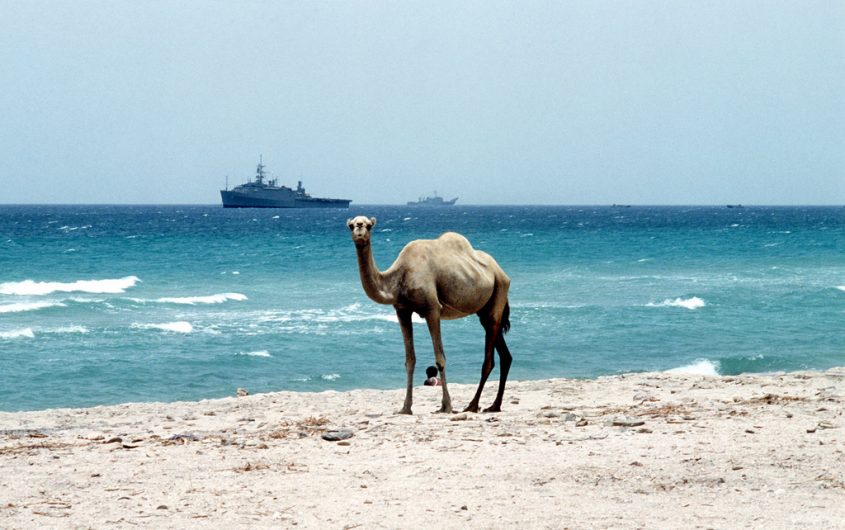
Global Memory Clashes Or the End of Serenity

Romain Faure
Freie Universität Berlin
Romain Faure is deputy head of the International Network University Division of Freie Universität Berlin. He holds a PhD from the Technische Universität Braunschweig, Germany and the Université Paris-1 Panthéon-Sorbonne, France. In his dissertation, published under the title Netzwerke der Kulturdiplomatie. Die Internationale Schulbuchrevision in Europa 1945-1989 (Networks of cultural diplomacy. International textbook revision in Europe; Munich: De Gruyter-Oldenbourg; 2015), he mapped and analyzed the revision activities in Europe during the Cold War. He was a Harry & Helen Gray Reconciliation Fellow at AICGS in 2013.
His current interests revolve around the idea of encouraging a historical dialogue between historians of the Mediterranean. He organized a first workshop on this topic at the Forum Transregionale Studien in Berlin, whose results are available on the Forum’s website.
He is a 2018-2019 participant in AICGS’ project “A German-American Dialogue of the Next Generation: Global Responsibility, Joint Engagement,” sponsored by the Transatlantik-Programm der Bundesrepublik Deutschland aus Mitteln des European Recovery Program (ERP) des Bundesministeriums für Wirtschaft und Energie (BMWi).
Coming to terms with the past has become one of the very core features of German political identity in the second half of the twentieth century. In fact, actively dealing with past conflicts in order to overcome them is an attitude that has spread over Germany to grow into a signature of today’s European politics. The Nobel Peace Prize that was awarded to the European Union in 2012 acknowledged, among other things, the EU’s “successful struggle for peace and reconciliation.” The time when one could speak of “hereditary enemies on the Rhine” to describe the Franco-German relationship has gradually been replaced by a new European memorial landscape where Berlin and Paris, London, Rome, or Brussels jointly commemorate past tragedies.
Does it mean that Germany and Western Europe now have a serene relationship with the past? No, they do not. But the conflict Germany and Western European countries have to come to terms with is not a conflict the same way World War I and II were conflicts. We are better off to call it a memorial field of tension: the relationship between Western European countries that have ruled and transformed large parts of the globe for a few centuries and the rest of the world. Germany and Europe can no longer ignore that they are central actors in this complicated, utterly emotional, extremely volatile, globalized network of conflictual memories.
Let us zoom in on one part of this global memory network that is essential to Europe: the Mediterranean region. Here, the memorial field of tension comprises at least three dimensions:
- Colonialism. Nearly all the major colonialist countries of the Modern Age are located on the northern shore of the Mediterranean. Nearly all countries of the southern shore have been colonized from the beginning of the nineteenth century onward. Not a surprise, this entails a deep gap between both shores in the way the colonial past is being remembered.
- “Islamization of Europe” and “Modern crusades.” Far-right forces on both sides of the Mediterranean see the integrity of their countries’ cultural or religious identity in jeopardy because of the increasing influence of “Islam” on the one hand or “the West/the Christians” on the other hand. Particularly in Europe, old-fashioned racism has given way to a morbid culturalism assessing that the historically deep-rooted (if not eternal) Christian and Muslim “civilizations” are incompatible and doomed to clash.
- Past and current migrations. For economic and historical reasons, European societies have long stimulated immigration from people from the southern and eastern shore of the Mediterranean. A side effect of these migrations and of globalization in general is that memory clashes in the Euro-Mediterranean region are not only leading to conflicts between different countries (e.g., Turkish-Armenian strained relationships), but are also fueling tensions within these countries (e.g., the memory of the Algerian war in France.
So what do we need? I argue that one of the problems is that the historical culture in Germany and in Western Europe is very superficial when it comes to the history of the Mediterranean and therefore far too vulnerable for instrumentalization. We need a historical culture that really breaks with Eurocentrism, integrates the history of regions outside Europe, and becomes more resistant to poisonous, historical, unfounded discourses. A historical culture that becomes more aware of memorial discourses across the Mediterranean, too. This doesn’t mean a historical culture that keeps silent about historical and current conflicts, but one that deals with them on the basis of thorough historical research.
The position of the United States in the field of Mediterranean memory clashes is not as different from Western European countries as one could think. For sure, the United States does not carry the burden of a colonial past in the region. Nevertheless, its geopolitical projection in the Middle East after 1945 has been massive and led to a widespread resentment among large parts of the Arab population. On the other hand, anti-Muslim feelings in the United States are well shared, even on a governmental level, where the current administration prominently revived the idea of a clash of civilization (e.g., “Muslim ban”). On both sides of the Atlantic, therefore, promoting a less vulnerable historical culture when it comes to the Middle East and North Africa could be beneficial. A new kind of transatlantic cooperation could even evolve from this joint challenge. Mediterranean affairs are far from being a blind spot in transatlantic discussions; forums like the Mediterranean Program of the German Marshall Fund help to concentrate and shape them. For understandable reasons, security issues still represent the lion’s share of the debates. But the idea that a long-term perspective is needed has gained a foothold, focussing not only on reactive politics but also on more durable, confidence-building action that takes into account cultural and memorial dynamics.[1]
To make a change in the historical culture of a country is quite a task. Yet, we should be aware that for many years now, there has been a vivid historical research on the entangled history of the Mediterranean. Scholars in Europe, in the Arab world, in Turkey, and in the United States have produced and debated scientifically founded narratives. One should pay much more attention to these narratives because they are so important for our understanding of today’s world. Only through an intensive and long-lasting collaboration between historians and journalists, educators and social media activists will these politically relevant results of scholarly research find their way into the general public conversation.
[1] See for example: Emiliano Allessandri, “Forced Convergence? Transatlantic Strategy in the Global Mediterranean,” Policy Brief, GMF Mediterranean Program, April 2015, and Damien Helly, “Cultural Diplomacy and Cooperation in the Mediterranean: a Constant Investment,” in IE-Med. Mediterranean Yearbook 2017, p.307-311.








